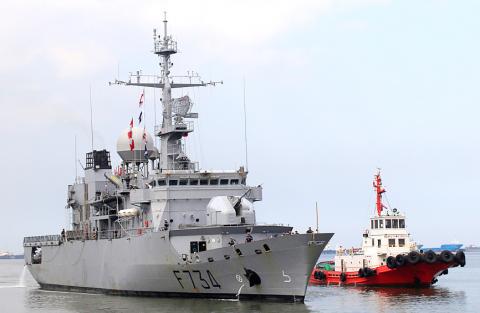A French warship passed through the Taiwan Strait earlier this month, US officials said, a rare voyage by a vessel of a European nation that is likely to be welcomed by Washington, but increase tensions with Beijing.
The passage is a sign that US allies are increasingly asserting freedom of navigation in international waters near China, and it could open the door for other allies, such as Japan and Australia, to consider similar operations.
Two officials, speaking on condition of anonymity, said a French military vessel carried out the transit on April 6.

Photo: Reuters
One of the officials identified the warship as the French frigate Vendemiaire and said it was shadowed by the Chinese military.
The officials said that as a result of the passage, China notified France it was no longer invited Tuesday’s naval parade to mark 70 years since the founding of China’s People’s Liberation Army Navy.
The parade featured Chinese aircraft carrier the Lioaning and Chinese-made Nanchang guided missile destroyers. Warships from India, Australia and Japan also participated.
France yesterday reaffirmed its commitment to “freedom of navigation under maritime law,” an aide to French Armed Forces Minister Florence Parly said.
“The national navy crosses the Taiwan Strait about once a year, without any incident nor reaction,” the aide said after China confirmed lodging an official protest over the voyage.
The French transit comes against the backdrop of increasingly regular passages by US Navy and Coast Guard vessels through the Taiwan Strait.
Asked by reporters to comment on the passage of the French warship, President Tsai Ing-wen (蔡英文) said that the Taiwan Strait is in international waters and that all kinds of vessels pass through it regularly.
The armed forces have “complete and precise” information regarding all vessels passing through the waterway, regardless of whether they are military or civilian vessels, she said.
Ministry of National Defense spokesman Major General Chen Chung-chi (陳中吉) said by telephone that the Strait is part of busy international waters and it is “a necessity” for vessels from all nations to transit through it.
He said the ministry would continue to monitor the movement of foreign vessels in the region.
There was no immediate comment from the Chinese Ministry of Foreign Affairs or Ministry of National Defense.
“This is an important development both because of the transit itself, but also because it reflects a more geopolitical approach by France towards China and the broader Asia-Pacific [region],” said Abraham Denmark, a former US deputy assistant secretary of defense for East Asia.
The transit is a sign that nations such as France are not only looking at China through the lens of trade, but from a military standpoint as well, Denmark said.
Last month, France and China signed deals worth billions of euros during a visit to Paris by Chinese President Xi Jinping (習近平).
French President Emmanuel Macron wants to forge a united European front to confront Chinese advances in trade and technology.
“It is important to have other countries operating in Asia to demonstrate that this is just not a matter of competition between Washington and Beijing, that what China has been doing represents a broader challenge to a liberal international order,” said Denmark, who is with the Woodrow Wilson Center think tank in Washington.
Additional reporting by Staff writer and AFP

SECURITY: As China is ‘reshaping’ Hong Kong’s population, Taiwan must raise the eligibility threshold for applications from Hong Kongers, Chiu Chui-cheng said When Hong Kong and Macau citizens apply for residency in Taiwan, it would be under a new category that includes a “national security observation period,” Mainland Affairs Council (MAC) Minister Chiu Chui-cheng (邱垂正) said yesterday. President William Lai (賴清德) on March 13 announced 17 strategies to counter China’s aggression toward Taiwan, including incorporating national security considerations into the review process for residency applications from Hong Kong and Macau citizens. The situation in Hong Kong is constantly changing, Chiu said to media yesterday on the sidelines of the Taipei Technology Run hosted by the Taipei Neihu Technology Park Development Association. With

CARROT AND STICK: While unrelenting in its military threats, China attracted nearly 40,000 Taiwanese to over 400 business events last year Nearly 40,000 Taiwanese last year joined industry events in China, such as conferences and trade fairs, supported by the Chinese government, a study showed yesterday, as Beijing ramps up a charm offensive toward Taipei alongside military pressure. China has long taken a carrot-and-stick approach to Taiwan, threatening it with the prospect of military action while reaching out to those it believes are amenable to Beijing’s point of view. Taiwanese security officials are wary of what they see as Beijing’s influence campaigns to sway public opinion after Taipei and Beijing gradually resumed travel links halted by the COVID-19 pandemic, but the scale of

A US Marine Corps regiment equipped with Naval Strike Missiles (NSM) is set to participate in the upcoming Balikatan 25 exercise in the Luzon Strait, marking the system’s first-ever deployment in the Philippines. US and Philippine officials have separately confirmed that the Navy Marine Expeditionary Ship Interdiction System (NMESIS) — the mobile launch platform for the Naval Strike Missile — would take part in the joint exercise. The missiles are being deployed to “a strategic first island chain chokepoint” in the waters between Taiwan proper and the Philippines, US-based Naval News reported. “The Luzon Strait and Bashi Channel represent a critical access

Pope Francis is be laid to rest on Saturday after lying in state for three days in St Peter’s Basilica, where the faithful are expected to flock to pay their respects to history’s first Latin American pontiff. The cardinals met yesterday in the Vatican’s synod hall to chart the next steps before a conclave begins to choose Francis’ successor, as condolences poured in from around the world. According to current norms, the conclave must begin between May 5 and 10. The cardinals set the funeral for Saturday at 10am in St Peter’s Square, to be celebrated by the dean of the College